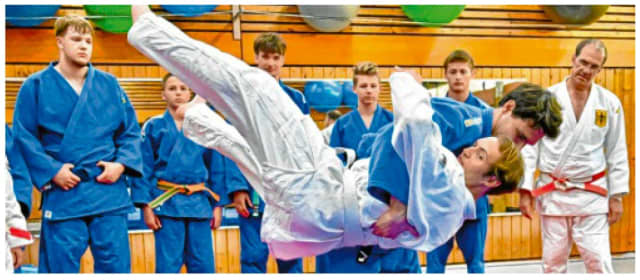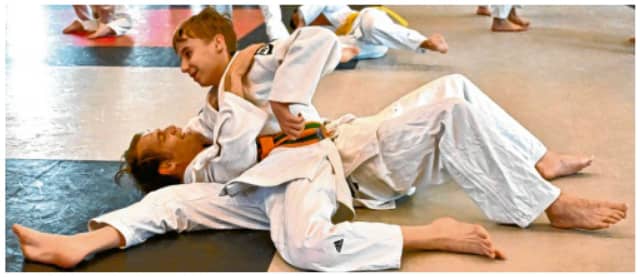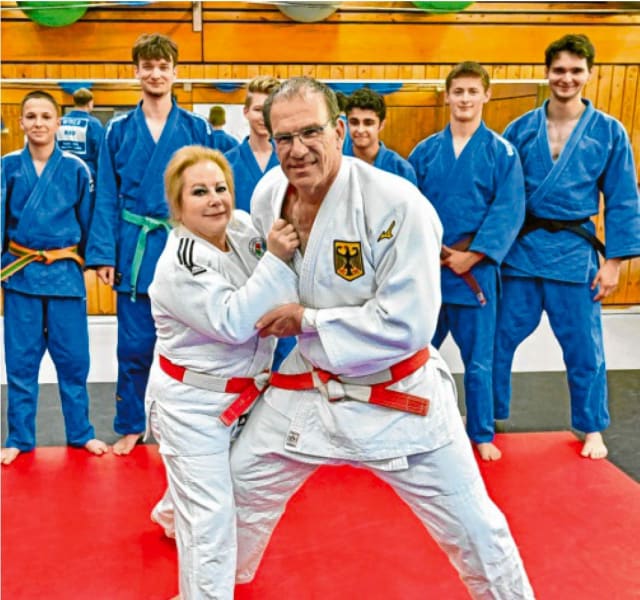"While I'm still thinking about what this means, a judoka throws me over his shoulder. Luckily, I land softly, because the judoka of the Königsbrunn police practise these kinds of techniques on tatami. Apparently, I didn't do everything correctly, "The outstretched hand must touch the tatami," coach Johannes Daxbacher explains to me. The next time, I reach out just in time. Five throws later and I've understood the technique.
Admittedly, being thrown is relatively pleasant, even though I'm already out of breath. I'm aching in unfamiliar places but first things first, an obstacle looms in the locker room: how do I put on this judo suit? Daxbacher helps me. I later realise it's a bit too big for me. I receive instructions, "The most important thing is not to hurt the other person," explain Johannes and Regina, who have been practising the sport for decades; they even met on the tatami. Respect for your opponent generally plays a major role, I notice quickly. I have never bowed as often as I did that day.
To warm up, I find myself on the mat with the juniors from the Königsbrunn judo section. My teammates are between 4 and 14 years old. We start with frog jumps, other jumping exercises and the backward roll I dread. I haven't made a fool of myself yet, but I see potential for it. I wait and see, I observe the others. Of course, they are more than 20 years younger than me. My ambition is piqued. The first time, I barely manage the roll. The youngsters try to hide their smiles. I think I can do better and even the second time, I think it's pretty successful.
That was just the warm-up and now it's time for the specific exercises. I'm exhausted and sweating profusely. First, I face Leo. He's a little taller and a little heavier than me. We practise a few small throws. I've never done martial arts and I find it difficult at first. I approach the situation with some hesitation, while my opponent is much less reticent, but with each hold or throw, my reserve diminishes and I dare to throw my opponent onto his back. I manage it quite well! In the next round, I'm grappling with Lars. He weighs 20 kilos less than me. My weight is a disadvantage because I'm technically very inferior too. I struggle with holds and constantly ask myself questions. Where should I hold on? How do I land on my opponent? What's the best way to fall? There are a lot of things to consider. "Judo isn't just about strength, it's also about technique. You need good body control, co-ordination and flexibility," explains Daxbacher. As a football player, flexibility is particularly important to me. The more I practise holds and throws, the more I improve, and it becomes really fun. At the same time, I find myself facing even more experienced athletes and I don't feel very comfortable.
I then face another judoka, who lifts me effortlessly. I am thrown to the mat several times. I am happy to be back with the younger ones after that but here too, things are getting serious. "Alara, watch out for Mr Richly," says Daxbacher. I laugh a little because Alara is 13 years old and is half my weight but she is quite strong. After two minutes of grappling exercises, we are constantly moving and have to compensate for each other's movements. Two minutes is really long, I think. I am dizzy but I don't get a break. Randori is coming. Now I understand some of what Daxbacher meant: although Alara is significantly smaller and lighter, she manages to free herself from my grip while conversely, I have a lot of trouble escaping hers. I only manage it by using every muscle. I'll still feel this tension days later.
After more exercises, it's over for me. The children and teenagers move on to even more complex techniques. I'm glad to be off the mat because I don't want to injure myself or my training partner and with my co-ordination, I'd be afraid of kicking someone. Instead, Daxbacher shows me a few more moves. I don't stand a chance against this 62-year-old. This professional not only has impeccable technique but also plenty of strength.
Then it's time for me to call it a day. Exhausted, I take off my judogi, now soaked with sweat. I'm out of breath, even though I've only trained for an hour. In the performance group, it can sometimes last up to three hours. I take my leave but not without taking stock. Johannes Daxbacher is satisfied, "It looked pretty good, the falls went especially well. You shouldn't underestimate that because falling is an art. Next time you can join a beginners' group. It's never too late to start.” I'll think about it.
I can still hear the teacher's words, "Judo mercilessly exposes your weak points." He's absolutely right. It was fun, though. I need to work on my flexibility and endurance for the next session. At least now I know what o-goshi means. Next time, I won't let myself be thrown over the hips, at least not so easily."
There's no age limit for starting judo. Everyone can find what they're looking for and set their own goals. Whatever age you start judo, there's something to learn or perfect. In Sebastian Richly's case, he was able to understand the importance of falling, but also the values of judo, useful on and off the mat. Hajime!
Source: CLICK HERE



